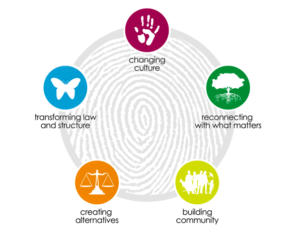THE ANTITHESIS PROJECT
 After tuning into Adam Carrel from EY Australia talking on ABC’s The Drum last night, I tracked down the recent report, ‘Enough: A Review of Corporate Sustainability in a World Running Out of Time’, from the Antithesis Project with which he is associated. I’ve often listened to Adam Carrel with interest, as he seems to be a sane voice from Corporate Australia and the big consultancy firms which people like me associate with showing big corporations how to avoid their taxes, yet these are required to fund the public goods and services we all require for the sort of Australia in which we wish to live. Paying taxes is not bad practice; it is morally, economically and ethically responsible.
After tuning into Adam Carrel from EY Australia talking on ABC’s The Drum last night, I tracked down the recent report, ‘Enough: A Review of Corporate Sustainability in a World Running Out of Time’, from the Antithesis Project with which he is associated. I’ve often listened to Adam Carrel with interest, as he seems to be a sane voice from Corporate Australia and the big consultancy firms which people like me associate with showing big corporations how to avoid their taxes, yet these are required to fund the public goods and services we all require for the sort of Australia in which we wish to live. Paying taxes is not bad practice; it is morally, economically and ethically responsible.
After all Angus Taylor, now the Opposition Treasurer, responsible for energy policy in the Morrison Government was previously employed by McKinsey and Co. Part of their practice of influence is to ensure they cede their directors into the public service to help them secure contracts. And when you look at the level of consultancy contracting, it looks like a very successful strategy. But you have to say, Taylor’s performance politically has revealed him to be an ’emperor with no clothes’. So much for McKinsey’s claim to excellence.
I think this report by the Antithesis Project is therefore a significant correction to how many of us view the billion dollar consultancy industry. As the report states:
The corporate world is by far the most economically powerful and environmentally impactful bloc on the planet and short of a mass redistribution of that power and impact, voluntary corporate action will be an essential ingredient in the preservation of the biosphere.SYSTEMS CHANGE – NOT JUST SUSTAINABILITY BUT SYSTEMS-WIDE REGENESIS
I was interested to see how closely the Antithesis Project analysis is to the work of GreenPrints with their model of systems change to achieve a regenerative society including a regenerative economics. Their GreenPrints project uses this model to understand the linkages.
 THE CORPORATION
THE CORPORATION
Now all of these aspects of systems-wide change can be found in a corporation, both within its own ‘system’ and between it and its shareholders, suppliers and customers—all of whom who are the same time, members of the community, many with children and so therefore with a stake in generational change as we look into the face of climate change and linked environmental issues.
However, what is interesting to me is the way that the Report highlights the way the corporation came to be a victim of ‘mechanical mind’ arising from the Scientific Revolution and its way of recasting the world as a science of mathematical laws removed from human subjectivity, to produce an overarching philosophical approach that became known as scientific materialism, which was particularly strong in the Anglo-American world.THE CORPORATION AS A MACHINE
 The Report suggests that the way in which corporations operate might be easily regarded as simply the most common-sense approach towards dividing and rewarding effort, but this can obscure the fact that modern business management is based upon theory – management theory – meaning it is based on an interpretation of ‘commercial reality’ that is contestable, not set in stone.
The Report suggests that the way in which corporations operate might be easily regarded as simply the most common-sense approach towards dividing and rewarding effort, but this can obscure the fact that modern business management is based upon theory – management theory – meaning it is based on an interpretation of ‘commercial reality’ that is contestable, not set in stone.
It goes on to note that general views of management theory, particularly presented by US business schools, conceive of the modern corporation as a ‘machine’ subject to the laws of science as distinct from a locus of human cooperation subject to the norms of society.
The Report draws attention to how, in his extensive analysis of management theory, Duff McDonald writes that: “the notion of a firm as a machine, as opposed to an organism, is close to the original sin in the story of how the [American economy] has come to find itself in the predicament it is in today.”
Firstly, it led to the idea that as ‘machines’, corporations operated in an amoral domain where it would be unfair to suggest a company is doing the ‘wrong’ thing by prioritising profits over planetary sustainability because that was simply not within the operational parameters of the company at that time.
Secondly, it has led to the idea that all problems can be understood and solved through the examination of diagnostic data. Data is, of course, hugely important to knowing with certainty if a company’s sustainability strategy is working or not, but the insistence that data alone will illuminate the path forward has diverted the better part of the corporate sustainability industry since its inception.
Thirdly, the notion of the corporation as an independent ‘closed loop’ system has led to corporate sustainability’s excessive focus on the boundaries of operational control. Whilst it is clearly sensible for corporations to effect whatever positive change they can, where they have the leverage to do so, corporate sustainability has become unduly atomised. This is a problem because it is whole value chains that we need to put on a sustainable footing and some of the hardest but most consequential work needs to take place in the world that sits outside the boundaries of the corporate construct.THE REVIEW—EXCERPTS FROM THE REPORT
The antithesis project is an attempt to encourage more debate on the fundamental questions of corporate sustainability. Whilst the topic of sustainability is already the subject of a rich discourse, it is largely focused on questions of implementation rather than ‘first principles’, which means that core assumptions often pass untested and flawed ideas may constrain the realisation of crucial aims. The antithesis project seeks to deliberately contest prevailing theories of corporate sustainability in the hope that newer, stronger ideas emerge in the middle ground.
We need to start defining how sustainable a company needs to be, by when, for planetary boundaries to be observed and long-term restoration to occur. In addition, not all of sustainability fits into neat numerators and denominators, it can be subjective and abstract, even metaphysical, and so to make it fit we edit out these complexities and mischaracterise the problems, and their solutions, in the process.
But now that the world is twenty years away from global catastrophe the worst thing corporate sustainability can do is mask the extent of the problem.
These factors, and others, have resulted in management theory having a consequential effect on the implementation of corporate sustainability that hasn’t resulted in sufficient progress in operating within our planetary boundary. It has also meant that corporate sustainability has been admitted into the theoretical framework only insofar as it augments the framework and does not reject it.
This has further been complicated by the fact that many – though not all – corporations comprise highly linear hierarchies, with strict chains of command and concentrated decision- making authority. They generally control who has access to what information and who speaks in which forum.
Over time this has an effect not simply on what people say but on what people think, it encourages people to ‘stay in their lane’ and avoid taking up the challenge of systemic cross-functional change.
Whilst there might be a very good reason why it has been replicated so consistently by profit-seeking corporations, it is clearly not an environment geared to the prioritisation of hard sustainable reforms that put the pain before the gain.
In effect, a sustainable corporation will almost certainly not be one that fits the corporate mould, it will probably have to break it. And if this means that sustainable corporations shrink to an exclusive group that dare to push the boundaries of the possible then so be it. As our late colleague Brendan Le Blanc liked to say, the only thing more dangerous than the absence of progress is the illusion of it.LIVING WITHIN BIOREGIONAL LIMITS
A key aspect of this will be understanding the cumulative impact of multiple actors on a localised or globalized environment, and the cascading impacts from one ecosystem to another. Existing economic ‘inputoutput’ lifecycle analyses support the generalized understanding of value chain environmental impacts, but what is needed is a way to illuminate precisely which ecosystems underpin specific corporate value chains so that the sustainability of an organisation can be assessed against real world indicators.
This will not be an easy process.
Global supply chains are not forced upon global corporations; they are a convenience that must be reconciled with their consequences. If certain supply chains continue to remain so opaque that corporations cannot know or manage the sustainability of inputs then vertical integration always remains an option; one that is being increasingly used on sustainability grounds already
If a corporate is going to transform its value chain onto a sustainable footing, this will, for many, be the hardest initiative it will ever implement and this must be reflected in the competencies and passions of the wider business. It is not just a matter of competency but a matter of principle.
The boardrooms of a remarkable number of notionally sustainability-focused corporations contain Directors who privately or outwardly reject sustainability as a ‘woke’ agenda that is being foisted on corporations and constraining their ability to exercise their commercial free will. Others use a purported devotion to shareholder returns to argue that the corporation effectively does not have the right to make sustainability its first priority.
These Directors are, of course, perfectly entitled to these views and they are perfectly entitled to exercise them at a corporation that is not committed to sustainability. Obviously, we don’t want to replace one groupthink with another, but the presence of these views does not represent a healthy tension between ‘old school’ and ‘new age’ mentalities. It represents a clear incompatibility with the mission of the business and a significant impediment to the development and implementation of sustainability strategies.CONCLUSIONS FROM THE REPORT—FROM SUSTAINABILITY TO REGENESIS?

Lastly, how do we elevate the role of systems thinkers – those who understand that the planet, and our current economy, operates as a system of inextricably linked patterns, and that when one thing changes, it affects something else, and so on? ‘Sustainability’ cannot be achieved with a focus on one ‘topic’ at the expense of another.
We need to wire corporate sustainability into the wider network of scientific agencies, civil society bodies, multilaterals and educational institutions to retrieve it from being a silo of half measures and make it a part of a unified effort to restore the long-term health of the biosphere. We hope that the conversations initiated by this first report, and the summary of those conversations that will follow, shall in some small way contribute to this aim.
In our current economic system, competition is a key feature of business. But to address the environmental crisis before us, we need collaboration. What needs to change to allow us to collectively shift from competition to collaboration – so that our efforts drive the change we need at scale, and fast?
Do we need to reconsider the term ‘sustainability’ – which, upon reflection, has potentially lost its meaning in a world that has already far exceeded the tipping points sustaining life and humanity on the planet. Should we be talking about impact, or evolving to regeneration, or to something else?

![Call of the Dakini | A Memoir of a Life Lived [Extract]](https://regenesis.org.au/wp-content/uploads/2023/08/Catalogue-OF-Articles-by-Barbara-Lepani-July-2018-July-2023-.jpg)
Recent Comments